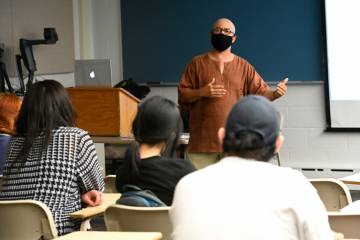- Name
- Jill Rosen
- jrosen@jhu.edu
- Office phone
- 443-997-9906
- Cell phone
- 443-547-8805
Americans are losing the ability to talk to each other, especially when they disagree. This is happening on university campuses, too, where experts say students increasingly are drawn to professors, speakers, and fellow students who have similar backgrounds and views, and are failing to learn how to engage productively with opposing voices.
To that end, the SNF Agora Institute announced today that it is launching a new university debate initiative that aims to model the habits and virtues of reasoned debate across different perspectives, and the possibilities for finding common ground amid disagreement.
A healthy democracy depends on citizens being able to talk to one another across ideological differences. Yet during the 2016 presidential campaign, only a fifth of voters discussed politics with someone of the opposing party, down from one third in 2000. According to Pew, the share of Americans who hold a highly negative view of the other political party roughly tripled from 1994 to 2016. Meanwhile, research shows that universities are not doing their part to model debate across difference: most campuses only hold one event per year on average in which speakers debate a public policy issue from competing perspectives.
At this moment when public discourse seems poisoned by a polarized politics and a fragmented news and social media landscape, universities have a rare opportunity to showcase constructive debate and help students strengthen the skills to bridge divides.
"For many young people, college is the first time they will live and study alongside people whose backgrounds and beliefs differ significantly from their own," Johns Hopkins University President Ron Daniels said. "As universities, we should be modeling the art of substantive, respectful disagreement and debate. With this new initiative, the SNF Agora will help to infuse our campus with that spirit, and I am excited to see the conversations it will inspire."
The initiative will be led by a new dialogue and debate director with experience in debates, who will work in close partnership with a student committee to plan and carry out a series of debates over the course of each academic year. The director will moderate marquee events, guide the students directly involved in the initiative, and teach the values and methods of debate more broadly across the university. The dialogue and debate director is a new, full-time position within the SNF Agora Institute.
The Hopkins Student Organization for Programming will convene the new student committee, which will identify and select debate topics and speakers. This primarily student committee will comprise five to seven JHU students, a Center for Social Concern staff adviser, and a faculty adviser. Johns Hopkins students can apply to serve on the committee through the Hopkins Student Programming Board.
Beginning in the fall of 2022, the initiative will host a pair of marquee moderated debates each year that bring to the university major speakers, such as leading scholars, public intellectuals, former government officials, and media personalities. The program will also fund and support a number of additional debates organized by students each semester, to enable healthy debate to be a recurring feature of campus life.
"This new debate initiative is another way we hope to further SNF Agora's mission of cultivating the modern-day agora, by bringing people with different beliefs, backgrounds, and ideologies together to contest values and ideas in a respectful, constructive way," said Hahrie Han, inaugural director of the SNF Agora Institute. "We are especially excited to be able to work closely with students on this effort, so that they have a voice in shaping the agora."
Posted in University News, Student Life, Politics+Society
Tagged snf agora institute, democracy









